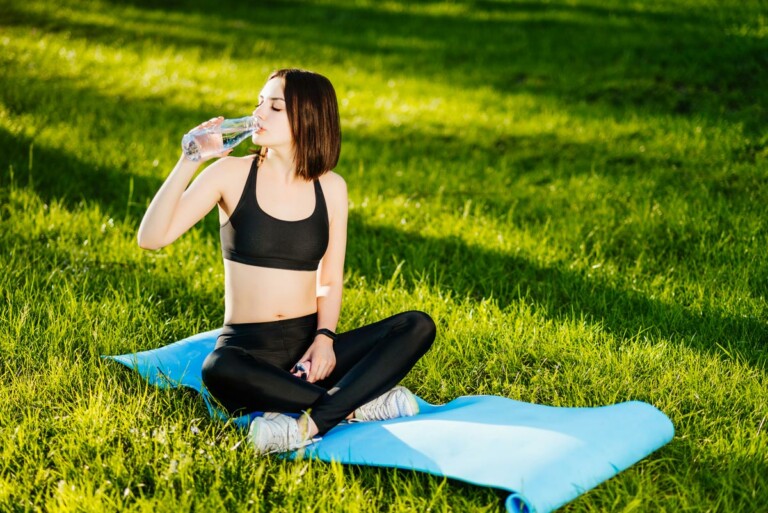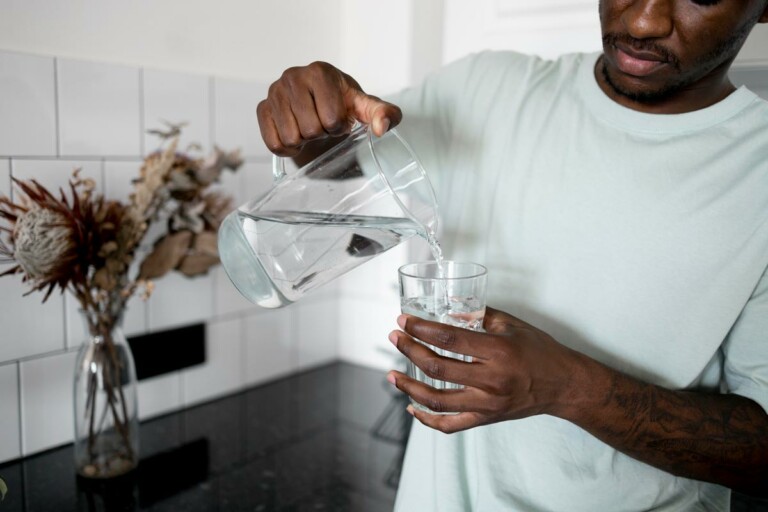Staying well hydrated during exercise is always important, but when summer days bring rising temperatures, it is crucial to prioritize your fluid intake. Not getting enough water during your morning run, forgetting to sip while hiking on the trail, or sweating while gardening under that steamy sun can send us on a path to dehydration doom. The following information will help you understand optimal hydration strategies and give you tips on how to listen to your body so that you can avoid turning into a raisin during your summer activities.
Hydrate regularly, and extra before exercise
How much water do you need? As with most questions about the body, it depends! Most healthy individuals meet their hydration needs by simply paying attention to their thirst. A report by the Institute of Medicine of the National Academies states that while it isn’t a perfect science, the general recommendation for daily water intake is 90 ounces for women and 125 ounces for men (2.7 liters and 3.7 liters respectively) – this includes all fluids (even caffeinated beverages) and water derived from food. These numbers, of course, can vary based on age, body weight and activity level as well as environmental conditions such as heat, humidity, altitude and wind
Before heading into the sun, especially if you plan to exercise, ask yourself the following questions: what have I had to drink in the past few hours and how does my body feel? According to the American College of Sports Medicine (ACSM), the general recommendation is 16 to 20 fluid ounces of water about four hours before exercise, and 8 to 12 fluid ounces of water 10 to 15 minutes before exercise. Consuming a small meal or fluid with sodium (salt) beforehand can also aid in fluid retention.

Closely monitor your fluid intake during exercise
Did you know that being even slightly dehydrated can impact your endurance, concentration and reaction time, leading to an increased potential for injury? And, while it varies per individual, medically reviewed reports state that the average person typically sweats anywhere from 20 to 70 ounces (.5 – 2 liters) per hour during moderate-intensity activity.
In order to balance out fluid loss during activity, the ACSM recommends that if you are exercising for less than 60 minutes, aim for 3 to 8 fluid ounces of water every 15 to 20 minutes. If exercising for more than 60 minutes, it is important to incorporate fluids that contain carbohydrates and electrolytes. Sports beverages and coconut water are a few good options. Plan on drinking 3 to 8 fluid ounces every 15-20 minutes, but make sure not to exceed more than one liter of fluids per hour during exercise. Drinking too much can lead to hyponatremia, also known as water intoxication.
Hydrate after exercise
Jump on the scale before and after exercise. Mild weight loss during an endurance event is acceptable, but a 3 percent or more weight change can indicate significant or serious dehydration. For every pound that is lost, drink 16 to 24 ounces of water. The goal is to correct your losses within two hours after exercise. No scale in sight? Check the color of your urine instead. When properly hydrated, urine should be pale yellow to clear in color.

Know the symptoms of dehydration
Dehydration, the first stage of heat exhaustion and heat stroke, occurs when you use or lose more fluid than you take in, and your body doesn’t have the necessary balance of fluids to carry out its normal function. While thirst is one of the most obvious symptoms of dehydration, it is often one of the later indicators, especially in older adults. Early signs of dehydration include: dry mouth, mild physical or mental fatigue, less frequent urination and darkened urine.
Later symptoms of dehydration include, but are not limited to:
- Muscle cramping
- Loss of appetite
- Flushing
- Dry, cool skin
- Decreased skin elasticity
- Headaches
- Rapid heart rate and breathing
- Lightheadedness or dizziness
- Nausea
- Confusion
- Increased fatigue
- Sunken Eyes
When to seek medical help for dehydration
Dehydration can typically be remedied by replenishing fluids and electrolytes. However, if you are experiencing mild to moderate symptoms of dehydration and develop severe diarrhea or vomiting, it is recommended that you reach out to your doctor promptly to discuss your concerns.
Immediate medical attention is advised if you develop the following:
- Confusion, altered mental status, slurred speech
- Extreme thirst
- Fainting, unconsciousness
- Profuse sweating or poor body temperature regulation
- Seizures
- Very high body temperature
Dehydration can be a serious side effect of not managing fluids during exercise, especially on those hot summer days. However, it is easily preventable by listening to your body and remembering a few key facts about hydration. Next time you hit the trails or head out into the sweltering heat, keep this article in mind. Enjoy the rest of the summer!

Starting a new exercise routine? Physical therapy can help!
As physical therapists, we know the importance of movement for overall health and well-being. From injury recovery to achieving optimal performance, our passion is to help every patient reach their goals and live an active, pain-free life. Get started with PT today!

